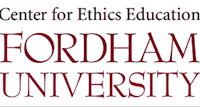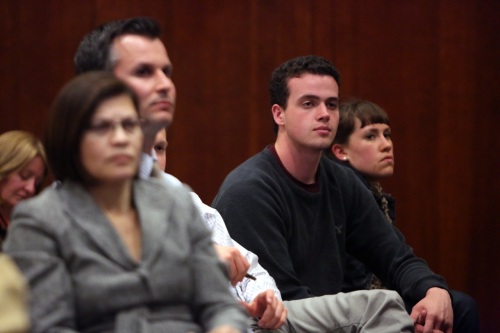At a recent interdisciplinary conference hosted by the Fordham University Center for Ethics Education, a distinguished panel comprised of university presidents, academics, and the Under Secretary of Education discussed the value of liberal arts education. Each speaker made compelling arguments highlighting the importance and value of liberal arts education, including information about cost, salary, lifetime learning, the residential college campus experience, and even the history of the debate on the worth of liberal arts education.
But what do the students think? As individuals who made the deliberate choice to opt for a liberal arts education, what do students at Fordham University believe is the value of their education? What are their biggest concerns?
Predictably, student debt is high on their priority list.
“Educational institutions and government have the responsibility of ensuring that student debt does not become so great that it cannot be paid off,” said Carolyn Guerrero, FCLC ‘17. “While it is reasonable to expect a student to pay for their college tuition (and thus pay off their loans, if they took them), it is not reasonable to expect a student to pay off a loan when interest rates are so high that” his or her debt burden becomes unmanageable. According to Guerrero, “it then becomes an institutional responsibility to make sure that debts do not become insurmountable.”
Similarly, Katrina Bernhardt, FCLC ’17 believes that responsibility for the recent, increasing student debt crisis lies with educational institutions and government, as well as with the student.
“This recent pressure for everyone to attend college leads many to graduate without career plans and/or jobs and is partially the source of the accumulating student debt,” she explained. “Although college isn’t ‘for’ everyone, the privilege of college should be available to all. Educational institutions and the government are responsible for educating young adults about the real purpose and value of college, and in effect, protecting them from incurring large debts. The government and universities should make greater efforts to ensure every student, who expects to graduate in four years, is not forced to stay longer, due to class unavailability or closed-out classes.”
According to Ruben Cuellar, FCLC ’17, educational institutions should make sure that the payout of attending college is larger than the resources that have to be invested into an education. He believes that this is accomplished when an education gives the young adult a competitive edge when entering the job market.
“The debt that comes from a college education should not be crippling,” he urged, requiring individual graduates to forego career opportunities because he or she needs to pay off debt by taking a job in another field.
Yet for Cueller, a liberal arts education is more than just a means to obtaining employment. “I gleaned from the conference that colleges need to teach students skills like adaptability, complex problem-solving, and a desire to learn, which are inherent within a liberal arts education and prepare the graduate for a variety of career paths as well as a larger chance for success and upwards mobility in those career paths,” he said.
The conference also addressed the impact of liberal arts education on the moral formation and development of students. In her opening remarks, Center for Ethics Education Director Dr. Celia B. Fisher posed the question: Will a weakening of arts and science offerings similarly weaken the developing ability of young adults to discern, preserve, and pursue moral goods for themselves and for subsequent generations?
Guerrero does not believe that a weakening of arts and science offerings will completely weaken moral abilities within young adults, as many young adults seemed inclined to research and make moral decisions on their own. However, she notes that with the increasing use of social media “morality can often become blurred, especially for children and young adults who are only beginning to discover themselves. It is with this that arts and science offerings can help. By taking courses in the arts and sciences, these abilities can be strengthened and become clearer.”
Cueller, on the other hand, believes that a weakening of arts and science offerings will weaken moral abilities within young adults. “Where else would they learn the skills necessary for that type of motivation and innovation?,” he questioned.
Lastly, Fisher posed the question: What are the societal consequences of creating a false dichotomy between educational experiences that foster market utility versus ethical habits of mind?
According to Guerrero, as time passes and technology advances, the current market utilities that are valued diminish in their usefulness. “If educational experiences that foster these utilities continue being emphasized rather than ethical habits of mind, there is less societal improvement,” she continued. “An education that cultures ethical habits of mind is one that allows a person to improve in multiple areas of technological growth, as well as be a good, educated citizen.”
Cueller argues that above all, an emphasis on educational experiences that foster market utility seem to limit the individuals to that field only, which also limits the skills that the person can gain as well as the amount of success. “Educational experiences that foster ethical habits of mind lead to a more well-rounded individual that is versatile and prepared for more opportunities,” he said. “Of course, a proficiency in ethical habits of mind also leads to more success in whatever field the individual chooses.”
Each of the students who contributed to this post are part of the FCLC Honors Program. Special thanks to Senior Teaching Fellow James Van Wyck for his assistance with this post.
![]()
Written By Fordham Ethics
The Value of Liberal Arts Education: Fordham Students Share Their Perspectives was originally published @ Ethics and Society and has been syndicated with permission.
Sources:
Our authors want to hear from you! Click to leave a comment
Related Posts





